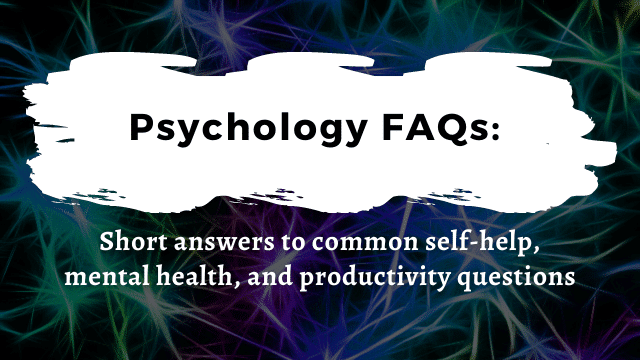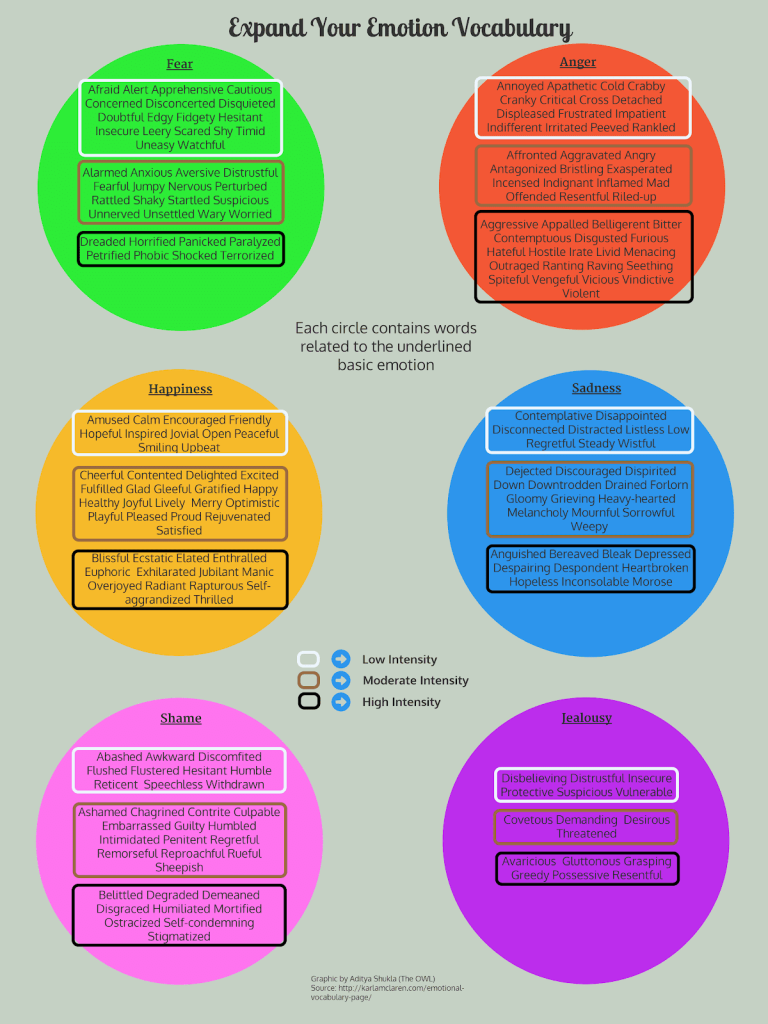I have covered the most Frequently Asked Questions about psychology and self-help in this post. Many of these common psychology questions focus on mental health, self-growth, learning, productivity, and self-improvement. These psychology FAQs have short answers as well as long answers. For the short and sweet answers, read this post. For the long answers and explanations, follow the links in each answer. I’ve covered them in-depth in other articles.

- How do I stop negative thinking?
- How are emotions described?
- How can I improve my well-being and mental health?
- How can I study and learn better?
- How can I concentrate better?
- How can I be happier in life?
- Should I do a social detox?
- How can I improve my creative thinking?
- What are some easy ways to get smarter?
- What are the common signs of mental health issues?
- How do I stop procrastinating?
- Sources
How do I stop negative thinking?
The easiest way you can stop negative thoughts is to distract yourself from your own mind. To do that, follow the 5–4–3–2–1 mindfulness grounding technique. List 5 things you see, 4 things you hear, 3 things you can touch, 2 things you smell, 1 thing you taste. Once that’s done, you’ll be grounded in reality, away from your thoughts. Here is how in detail.
Then, begin retraining your mind to separate the negativity from your thoughts. This is called cognitive defusion. Here are some techniques that will help you. One example is: Really, really slow down your thoughts by speaking them out in slow-mo. That makes the negative aspect less believable, and it won’t bother you as much. Practice regularly till the negativity dies out.
How are emotions described?
We show a few basic emotions like fear, anger, happiness, sadness, disgust, jealousy, etc., and some complex emotions like awkwardness, nostalgia, sexual desire, etc. Emotions are communicated between people using body language, behavior, and language.
Here’s a chart for emotion words people commonly use in English.

How can I improve my well-being and mental health?
- Focus on HEPAS – Health eating, Physical activity, and sleep.
- Focus on meaning and purpose. Spend a few hours of your week doing something very personally meaningful. It could be a hobby.
- Gain a sense of control, achievement, and independence in your life. Learn to have power over your mind and life choices.
- Work on your emotions by expressing gratitude, appreciating beauty, and develop a problem-solving mindset for things that stress you out.
How can I study and learn better?
- Study in short sessions and study-related things simultaneously.
- Find a way to relate your learning to your life. Make it fun and spark your curiosity.
- Learn to think and reflect on what you learned. While you do that, also try to remember what you learned.
- Improve memory by repeating something to yourself in increasing amounts of time.
- Have fun in life and don’t make learning a chore.
Read this to understand more about how you can study and learn efficiently.
How can I concentrate better?
Address 5 core psychological factors that affect concentration. Here is how.
- Intrinsic motivation – Do you really want to concentrate?
- Distraction & stimulation – Can your brain manage your current balance of things that distract you and things that stimulate you?
- Your perceived ability to learn – Can you imagine yourself handling your study workload? Do you believe you can conquer it?
- Selecting what to focus on – Do you really know what you need to focus on? Do you know what you should concentrate on first?
- Mental and physical resources to concentrate – Is your body and brain in the right condition to pull off a focused study session?
How can I be happier in life?
Follow the 8 core principles taught by the world’s leading happiness researcher.
- Express gratitude to increase positive emotions, positive memories, and reduce negativity.
- Become optimistic and cultivate hope without lying to yourself because hope is abstract and it defines what you can do.
- Nurture quality social relationships, even if you don’t need to be social all the time.
- Experience flow by doing an activity you are deeply engaged in, feel challenged by, and have the motivation for; explore new activities to get in the zone.
- Appreciate the beauty in life and deliberately pay attention to admire that beauty.
- Do personally meaningful things and find a way to relate to something.
- Take care of your body and pay attention to what it is telling you.
- Work on your physical body and shape it to your liking. It may be as small as a haircut or as big as a body-transformation, as long as you are satisfied with it.
Do it if you feel the need to. Your well-being depends on how you feel you are spending your time. If you feel the need to spend more time alone, go for it. However, don’t do a social detox because you have no other option. Do it only when you know you are doing it for yourself. Otherwise, it’ll backfire as loneliness. Alone-time is a choice, loneliness isn’t. Feeling like you need to spend time alone but just can’t is called Aloneliness. And high Aloneliness can be mentally damaging. Read this to understand this better.
How can I improve my creative thinking?
Creative thinking can be learned. One method is called “using construal levels.” Everything we think about is processed at multiple levels. Say you are talking. On one level, you can say you are communicating. On another level, you can say you are on a phone call with a friend discussing horror movies. See the difference in detail? The first level is abstract. The second level is concrete. Every thought can be processed in this abstract-concrete spectrum called the “construal level.” Once you learn to do that, you will get more creative.
Also, learn to let your mind wander freely, that’s necessary for ideas to start popping into your mind. Don’t apply pressure, flow with your thoughts. Some of them could be a sign of genius.
What are some easy ways to get smarter?
Read this for a list of 50+ practical things you can do to get smarter.
Follow 4 pointers:
- Pay attention and put in the effort to notice things around you.
- Talk with a variety of people and learn about their ideas, cultures, perspectives, and origin-stories.
- Consume a variety of information and broaden your horizons.
- Give a context to everything you learn and connect it to something in your life.
What are the common signs of mental health issues?
Here is a list of the most common signs of depression, anxiety, and poor adjustment.
General signs of poor psychological health are:
- You cannot feel pleasure for things you used to enjoy.
- You feel hopeless with no motivation and extreme helplessness.
- Your thoughts have changed dramatically in ways you don’t like.
- You have unexplained or amplified anger.
- You are pre-occupied with negative thoughts or ruminate bad scenarios.
- Your sleep is disturbed or you sleep too much or too little.
- You find it hard to focus anywhere and often feel confused.
- You feel ending your life seems like an acceptable option (please learn more[1] and reach out immediately[2]).
- Your close relationships are getting affected by your behavior.
- You find it hard to go through your day.
How do I stop procrastinating?
You procrastinate because of emotions, not laziness or bad time management. We procrastinate on things that cause us some anxiety. Sometimes, it is hidden. You may procrastinate due to a fear of failure, deep dislike toward something, or a feeling of not being good enough. Work on those emotions and procrastination will vanish. Baby steps at a time. Practice self-forgiveness. Set reasonable expectations for yourself. And most importantly, learn to tolerate negative emotions.
This question is perhaps the most popular psychology FAQ that has a very high number of poor answers. Here is a very well-studied scientific approach to procrastination that is corroborated by many, many researchers. All tips are evidence-based.
I will be updating this psychology FAQ list regularly as I write other articles and new questions emerge through discussions. If there is any question you’d like me to answer, please leave a comment and I’ll do my best to answer it!
Sources
[2]: https://www.befrienders.org/

Hey! Thank you for reading; hope you enjoyed the article. I run Cognition Today to capture some of the most fascinating mechanisms that guide our lives. My content here is referenced and featured in NY Times, Forbes, CNET, and Entrepreneur, and many other books & research papers.
I’m am a psychology SME consultant in EdTech with a focus on AI cognition and Behavioral Engineering. I’m affiliated to myelin, an EdTech company in India as well.
I’ve studied at NIMHANS Bangalore (positive psychology), Savitribai Phule Pune University (clinical psychology), Fergusson College (BA psych), and affiliated with IIM Ahmedabad (marketing psychology). I’m currently studying Korean at Seoul National University.
I’m based in Pune, India but living in Seoul, S. Korea. Love Sci-fi, horror media; Love rock, metal, synthwave, and K-pop music; can’t whistle; can play 2 guitars at a time.



























